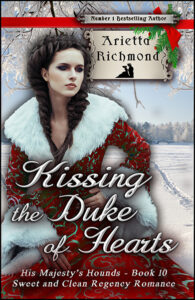
Evidence of Arietta Richmond's high volume output: not one but two omnibuses in this series
Writers' forums abound with heated discussions about the merits and demerits of churning books out fast, and in the run-up to NaNoWriMo, now seems a great time to add to the debate. ALLi member Arietta Richmond, indie author of Regency historical romance, shares her experience.
In communities where writers congregate, you will find opinions ranging from ‘books should take years to write, and go through dozens of rewrites, to be a ‘good book’’ to ‘readers aren’t that fussy, just get it out there’.
So – what is right? Is there even a ‘right’ in this case?
I think that the answer to that lies in understanding that every author is different – the process that works for one, will not work at all for another. Which means, in the end, that every approach can be right.
Not Just About Quantity

The first in one of Arietta Richmond's Regency romance series
There are some things that stay true, however, no matter which approach you take, such as:
- reasonable quality editing and proofreading is essential to creating reader satisfaction
- a good cover and blurb are usually the difference between a book that sinks without trace, and one that has a chance of floating to the top
So – why am I writing this? Simple – I am one of those people who can write books fast.
I get very frustrated by people who say ‘if you wrote it that fast, it can’t be any good’ – because that is so utterly full of assumptions, and that also implies that I would be willing to publish something that was not the best possible work, presented in the best possible way.
I am a big believer in quality, and I do my absolute best to publish books that are as good as I can get them. (which is why I am seriously considering going back and rewriting and expanding some of my earliest books – because I could do so much more justice to the stories now!)
How Fast Do I Write, I Hear You Ask?

Arietta Richmond's eighth title of 2017, due out in November
This calendar year, I have written eight books, ranging in length from 25,000 words to 62,000 words each.
In the last 30 days, I wrote on 20 of those days, and produced 112,000 words, being two books, and the first chapter of the next one (which I am working on the rest of now).
I write a single draft, and review/revise it once.
Then it goes to my beta reader team, who usually find between 10 and 30 micro errors in the book (things like ‘in’ instead of ‘on’, and other easily mistyped words where the brain, when proofing, just doesn’t see it). I have frequently received emails from people new to my beta team, along the lines of ‘your work is so clean when you send it to me – almost no errors!’ and I pride myself on keeping up that standard.
Why Do I Write That Fast?
- Because I have a process and have trained myself to work by it.
- I have editing experience, so that helps me see my own errors.
- Readers love it, because, even releasing approximately one book a month, I still get ‘when is the next book coming out?’ emails.
- It increases my income!
- Staying front of mind for readers is easier with regular releases.
- The ‘read through’ of people who buy one book in the series, then buy all the others, is excellent.
- I have a head full of stories that I have to get out. (I have another 40 books in the planned queue at present.)
My Process for Writing Fast
- Do a lot of planning before starting to write
- Outline every book, including information about character, linkage to other books, location, a synopsis, and eventually, a rough chapter-by-chapter breakdown.
- Don’t start writing until that plan /plot is at least 90% understood and sorted
- Don't consider the plan absolute – in the process of writing, things may move around, whole extra scenes may be added etc – but with the plan, you have a context to do that in, so that it does not produce continuity errors or leave open loops in the story.
- Define your characters well, and understand their actions, emotions, strengths and weaknesses, so that you know, before you start writing, how they will react in any given circumstance.
- Understand what your genre’s target reader audience like, want and expect in a book
- Keep a backstory notes file for your series – I have one that has a page for every single named person in each book, a page for each significant location etc (its Regency – even my characters horses get names and those go in the backstory notes). Much of what you keep track of may never be seen in a story, but it allows you to know why the things that are shown to the reader happen.
- Once all of that is prepped, sit down to write – for me, that can be many hours at a time – I just keep going, until hunger or thirst tells me how long it’s been. But if you write better in one-hour blocks, then that’s what you do.
- Do almost nothing else important for the week or so that each book takes to write – let that writing be the most significant thing in each day (of course, you still have to do the shopping, pay the bills etc, but only the critical ones!)
- Don’t angst! Write it, either the scene that is clearest to you at the time, or start to finish in order, whichever you like (that’s why you have a chapter by chapter plan, to help you put it all together at the end.)
- Don’t rewrite each bit over and over – just write it, tweak only minimally as you go. (the 80/20 rule applies here.)
- Get to the end. Put it aside for a day or two. Then come back and read it, start to finish, looking for things that need fixing (unless you have made a monumental mess of something, no major rewriting allowed).
- Send to beta readers, giving clear instructions about how they are to tell you where the errors are.
- Fix what they find.
My books rank well, and mostly have good reviews (you can’t please everyone!) with 4+ star average ratings, so I am definitely not abandoning quality for speed. (I’d love you to read my books, so that you can see the truth of that!)
I am just able to write that fast, because I have a process that works for me. So… next time you see the ‘is speed good or bad’ discussion, consider how different we all are, before making assumptions.
OVER TO YOU How do you prefer to work? How has your writing speed and productivity changed during your author journey? Is it time to slow down and stop pressuring ourselves, or is the need for speed a given in the successful indie author's life? Join the debate via the comments box!
#Writers - do you have a need for speed? Here's one author's guide to writing more, faster. Share on XOTHER HELPFUL POSTS ON HOW TO BOOST YOUR WRITING PRODUCTIVITY – FROM THE ALLi ARCHIVE




Thank you for sharing your techniques with us, Arietta!
I was going to exclaim at the 40 books in the queue, but I have a few series I want to write after the one I am working on now, inc one that might have 16 books in it for children.